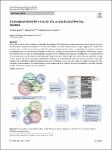Item Infomation
Full metadata record
| DC Field | Value | Language |
|---|---|---|
| dc.contributor.author | Brglez, Kristijan | - |
| dc.contributor.author | Perc, Matjaž | - |
| dc.contributor.author | Lukman, Rebeka Kovačič | - |
| dc.date.accessioned | 2023-08-09T08:54:12Z | - |
| dc.date.available | 2023-08-09T08:54:12Z | - |
| dc.date.issued | 2023 | - |
| dc.identifier.uri | https://link.springer.com/article/10.1007/s10098-023-02579-z | - |
| dc.identifier.uri | https://dlib.phenikaa-uni.edu.vn/handle/PNK/8773 | - |
| dc.description | CC-BY | vi |
| dc.description.abstract | Cities play a crucial role in achieving sustainable development. Decision-makers require assistance in developing city transformation plans amidst the emergence of various city models. A content analysis using concept mapping was conducted to examine smart, circular, and green city models. The analysis, supported by Leximancer, revealed that city models are evolving by adopting beneficial solutions from competitors, reflecting a strong focus on sustainable development. Additionally, twenty-four research areas essential for implementing a circular city were identified and validated. Furthermore, a conceptual model for a circular city was developed, incorporating the Define-Measure-Analyse-Improve-Control tool and a problem-solving system. | vi |
| dc.language.iso | en | vi |
| dc.publisher | Springer | vi |
| dc.subject | circular city | vi |
| dc.subject | achieving sustainable development | vi |
| dc.title | A conceptual model for a circular city: a case study of Maribor, Slovenia | vi |
| dc.type | Book | vi |
| Appears in Collections | ||
| OER - Khoa học môi trường | ||
Files in This Item:

